Review of Biometric Relations Between Relatives | Animal Husbandry & Veterinary Science Optional for UPSC PDF Download
Introduction
- A basic genetic phenomenon displayed by metric traits is a resemblance between relatives Full-sibs resemble one another more closely than half-sibs. Half are more alike then cosina The degree of resemblance provides a mere of additive genetic variance. It is the proportion of additive genetic variance (heritability) that helps to determine the kind of breeding programme to be adopted for improvement of the character."
- When a population is grouped into families of fall-abs or half-sibs the total phenotype variance can be analysed into two compenesis, the variance between familles (VS) and variance within (V) The ratio VB/VB + VE the intraclass correlation measures the atmilarity or resemblance of members of the same family. The variance Vs may se considered as the covariance of members of the same family.
- In case of offspring arent relationship, the data are paired as value of parent and mean of ofpring. The covariance between offspring and parent is obtained from the cross products. The degrees of resemblance can be expressed as regression of offspring on parent.
- Covariance is a property of the population. It is part of the total phenotypic variance. The covariance is different kinds of relationship measures part of the additive genetic variance.
- We shall consider four kinds of relationships whits are most frequently used namely, Offspring and one parent (i) Offspring and mean of parents, (ii) Halfails (iv) Pull-sis.
- Genetic Covariance Covariance can be of genetic and environmental origin. A common environment for members of the Anne family can contribute to environmental covariance. First, we shall take up covariance of genetic origin leaving the other for a later discussion.
- Offspring and one parent Mean value of offspring-3-2 the breeding value of one parent. Therefore covariance is between the genotypic value of parent (G) with half its breeding value (1/2 A)

- Dividing both sides by the number of parents gives the covariance as 1/2 var + 1/2 COV AD. It is known that COVAD is Zero, so COVOP = 1/2 Var.
Another method

Half-elb relationship: The mean genotype value of half-sib is 1/2 the breeding value of the common parent.
GHS = 1/2 A
This can be obtained by the longer method from Table 2 Squaring the offspring values and multiplying by frequencies and taking the out gives the covariance of hafa

Offspring and mid-parent: Let O be the mean of offspring and P and P value of the two parents.
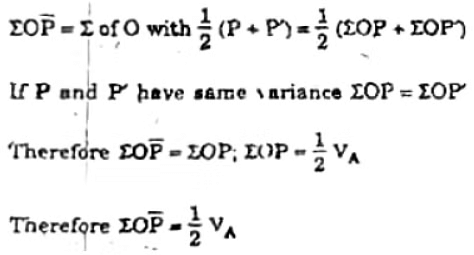
Full-albe: Covariance of fall-ae is the variance of means of full-ath families. This can be obtained from Table 3 which is tabulated the mitigated frequencies of genotypes, the mid-parent values, the mean values of progeny, and also the cross-products necessary.
The gentle covariance of full-siba is equal to halting the additive genetic variance pa quarter of the dominance variance. The reason is that full-sibs have both parents in common and a pair of full-ALBS have a quarter chance of having the same genotypes for any locus.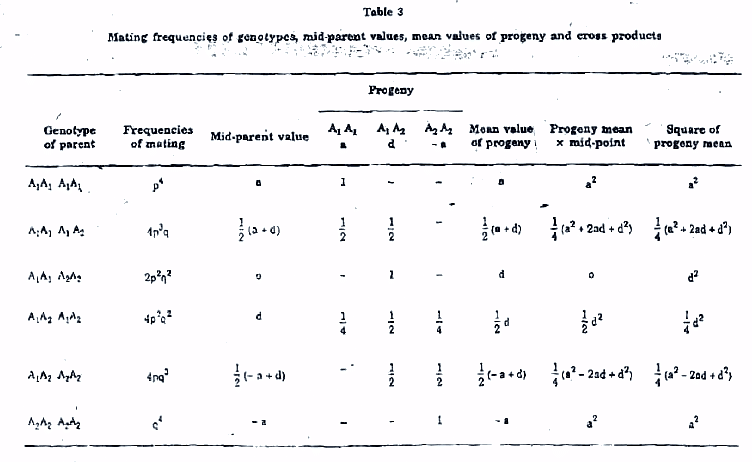
Phenotypic Resemblance: The resemblance among relatives is expressed as regression or intraclass correlation. In offspring parent relational regression is
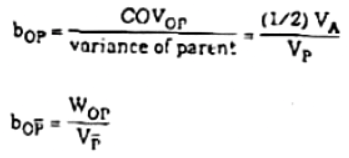
In semblance of half-sib families intraclass correlation
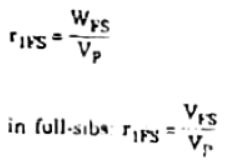
The formula, for phenotypic resemblances are gives in Table 4.
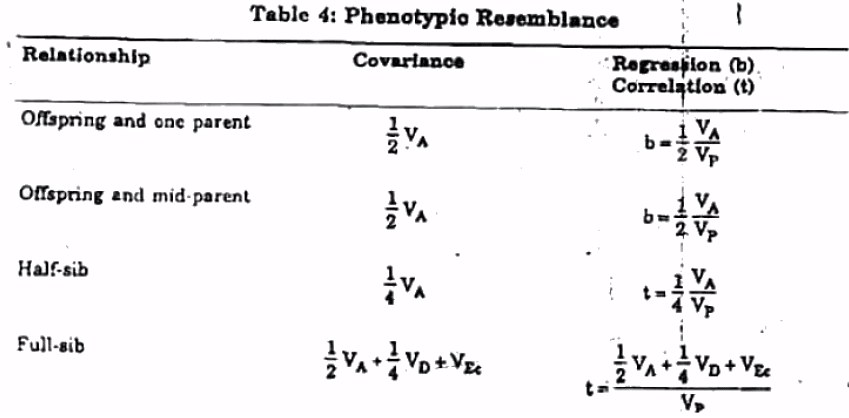
In adoring and mid-parent relationship the variance of mid-perent values is 1/2 VP
Let X and Y be the values of P and P
Mid-parent value 1/2 X + 1/2 Y, when both parents bere the same variance.
Covariance due to epistatic interaction: The covariance of relatives with contributions of two factors interaction are shown in Table 5.
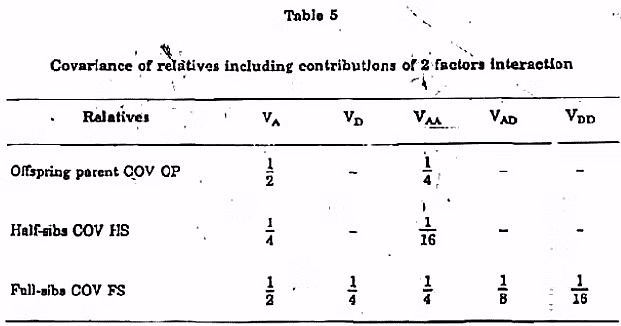
Interaction involving more than two loci becomes progressively smaller as the number of loc increases
Environmental Covariance: Genetic causes are not the only means for resemblance between relatives. When members of the same family are reared in a common environment it may give rise to covariance due to samo environment ag. litter from larger mothers are larger than those from smaller mothers, due to the mothering ability. Half-sibs grown on the same far, Drosophila is grown in the same culture media, and have a common environment contributing to their covariance.
Environmental variance can therefore be of two kinds, variance due to common environment (Vg) and the rest of the environmental variance (VEw)
VP = VEc + V Ew
Variance des to a common environment depends largely on the manner of grouping of individuals for exporting. In the relationship wo have studied, full-alb families will have a reasonable amount of covariance due to Vac To doubt that halfelbe will not have covariance due to Vgc is however not entirely realistic. The chief use of measurements of resemblance between relatives is to estimate the proportion of additive genetic variance, ie. instability of the character in the population.
FAQs on Review of Biometric Relations Between Relatives - Animal Husbandry & Veterinary Science Optional for UPSC
| 1. What are biometric relations between relatives? |  |
| 2. How can biometric relations between relatives be useful in forensic investigations? |  |
| 3. Are biometric relations between relatives limited to DNA analysis? |  |
| 4. Can biometric relations between relatives be used to determine paternity? |  |
| 5. Are there any ethical concerns associated with using biometric relations between relatives in forensic investigations? |  |















